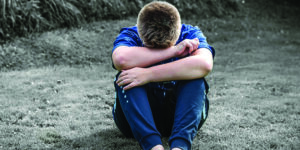THE WARNING SIGNS
How do I know if my teen needs professional help?
 When a child begins to fall into negative patterns, they usually exhibit warning signs of which parents should be aware. Many of these warning signs are also a part of normal teenage development, which makes it easy to believe that nothing is wrong. As a result, some parents don’t realize their child is involved in drugs, promiscuity, illegal activities, or other at-risk behaviour until it is too late.
When a child begins to fall into negative patterns, they usually exhibit warning signs of which parents should be aware. Many of these warning signs are also a part of normal teenage development, which makes it easy to believe that nothing is wrong. As a result, some parents don’t realize their child is involved in drugs, promiscuity, illegal activities, or other at-risk behaviour until it is too late.
Even the best parents can miss the warning signs and believe that this kind of struggle couldn’t happen to their children. The truth is, any child can succumb to the pressures and temptations that the world offers. Most of the families who come to Rock Solid Refuge for help missed the warning signs until their teen was in crisis.
Once you recognize your child is exhibiting these warning signs, sit down with them and talk about the concerns that you have. Our "In Crisis? Start Here" series is a good place to start. While many of these warning signs are also normal teenage problems, it's better to open up communication before you see multiple warning signs coming into focus.
So, what should you be looking for?

Dramatic changes in style of clothes, hair, music
Has your child started listening to radically different music? Is your kid making physical changes just to fit in? Is your child ‘dressing down’ to be accepted by friends at school? These are outward signs that your child might be succumbing to negative peer pressure.
Hanging out with a bad crowd (or different crowd)
When your child enters middle school and high school they will inevitably meet new friends. This is good. But is your teen changing their behavior or values to fit in with a new group of friends? This could be a sign of unhealthy or dangerous friendships, especially if the group your child is trying to fit in with seems to have questionable values.
Teens (and people in general) try to fit in to their friend group by emulating the behaviours that are accepted and encouraged by that friend group. Do some of these new friends smoke? If so, there’s a good chance you child will take up smoking as well.

Tardiness or truancies
As kids get into drugs, they tend to start ditching classes, too. This can be reflected in their grades, but there's more that you can do than wait to see what the next report card says. Make sure to talk to your child about what they’re doing at school and consider calling your child’s school from time to time to ask about their attendance, especially if you believe that they are lying to you.
Isolating from family
Is your child distant? Does he constantly want to be with his friends, away from home? When you ask him what he’s been doing, does he give a vague reply? Does your child want to eat in his room instead of with the family?
It’s normal and healthy for a teen to seek more autonomy as they grow older and prepare for life apart from the family. This normal behaviour can become dangerous when they completely isolate from the family. It is important to both give space and help guide them as they develop.

Changes in attitude and personality
Does it seem like your child is suddenly a completely different person? Has your child developed a tough-guy attitude? If your child is experimenting with at-risk behaviour, there’s a good chance you’ll see these changes. Often parents think this is just normal teenaged behavior, and they dismiss it. Don’t make this mistake; otherwise, you might overlook one of the most obvious signs.
Changes in sleep patterns
It is perfectly normal for most teens to stay up late and struggle getting up in the morning. If your child is getting very little sleep, however, this may be a sign of stimulant use. If this change happens very suddenly, it may be a stronger sign that your child has started using drugs.
Foul language
Has your child suddenly started using foul or obscene language, excessively? This disrespectful behaviour might indicate he is giving in to peer pressure, and it should be a warning sign to you. If your child is trying to fit in with his friends by cussing, sooner or later he may end up looking for other, more dangerous ways to gain acceptance.
Eating way too much or way too little
Eating too much or too little is another sign of drug experimentation that can be overlooked as normal teenaged behavior. Marijuana use makes people hungry while Speed and other stimulants can suppress hunger and lead to eating less. Be aware of your child’s eating habits and if anything dramatically changes.

Paranoia – everyone is out to get me
Does your child treat everybody as if he were the enemy? Does he believe everybody is out to get him? Does he seem overly paranoid? Understand, this is not normal teenaged behaviour. This is one of the most common signs of drug abuse and one you don’t have to look hard to see.
Dilated eyes – red eyes – glazed eyes
Do your child’s eyes look funny? Are they red all the time? Glazed? Are the pupils abnormally large or abnormally small? Does your child wear sunglasses, even at night, claiming they’re just to look cool? A person’s eyes show the effects of drugs. If you think your child is experimenting with drugs, pay attention to his eyes.

Sudden bursts of anger
Has your child developed a violent tendency, physical violence or yelling or threatening people? Is he prone to sudden, uncontrollable fits of anger? These are warning signs that your child could be experimenting with alcohol or drugs.
Consistent dishonesty
Lying once to go to a party is one thing, but consistently lying about where they have been and who they have been with may be a sign that your teen is headed down a dangerous path. Clearly there is a reason they don’t want you, as the parent, to know where they’ve been. When you catch them in a lie, try to get to the bottom of what they were trying to hide using active listening, not by lecturing or guilt tripping.

Extreme moods
Teens will be moody, there’s no question there. Their bodies and hormones are changing, moodiness can be expected. If your child suddenly has extreme fits of anger, long stints of sadness, consistently expresses hatred towards family members, or displays ongoing disrespectful attitudes, it may be a sign that something deeper is going on. Pay attention and attempt to determine what your child’s “triggers” may be. If these extreme moods continue for months without any logical triggers, it may be a sign of a mental health disorder or other complex behavioural problems. Don’t simply write it off as normal teen behaviour.
Dramatic mood swings
Does your child seem real happy one day, then terribly depressed the next? Do your child’s emotions go up and down constantly? This is often confused with ‘normal’ teenaged behaviour, but it can also be a sign of drug abuse or depression.

Excessive spending or missing money
If you keep noticing money is missing from your purse or wallet, or if your child keeps asking for large amounts of money, you need to have a serious talk with him.
Unexplained large sums of money
Is your unemployed or minimum wage-earning teen showing up at home with expensive jewelry, new gadgets or fancy clothes you’ve never seen? Unexplained money, coupled with a withdrawn and defiant teen, can often be the sign of a more serious issue like drug dealing or stealing. Teens living this lifestyle may also seem to lose money or valuables very quickly, as they trade it for drugs or are in unsafe situations where they have things stolen.

Self-Harm
Are there signs that your teen is cutting, burning or in any way mutilating themselves physically? If so, get help now. Do not attempt to intervene without professional help. Self-harm is commonly a coping mechanism, not a form of self-destruction. To remove the coping mechanism without replacing it with a healthy way to cope and a safety plan can be disastrous. This is not a warning sign that should be taken lightly! Learn more about self-harm here: https://www.familylives.org.uk/advice/teenagers/health-wellbeing/self-harm
No remorse for actions
All teens will make mistakes regardless of our parenting. The question here is: how do they react when they are caught? If your teen shows no remorse of guilt for the mistakes they have made, if they blatantly defy the rules you have laid out and demonstrate indifference when confronted, it is time to seek help.
In the midst of all of this, if your teen is struggling with addiction or other life controlling issues and lying to you about it, it’s important to try and improve your communication with your child and strive to earn their trust. We would encourage you to seek professional help, check out our video series “In Crisis? Start Here”, and consider applying to have your son join us at Rock Solid Refuge.
